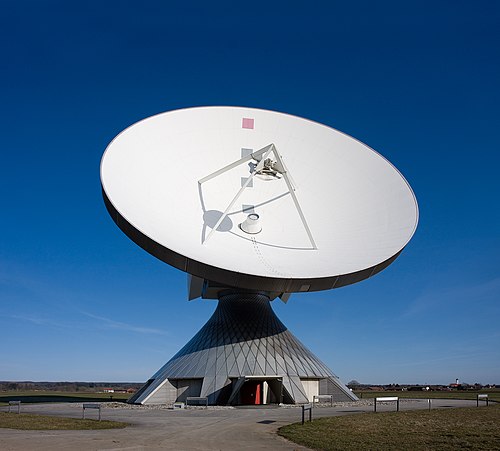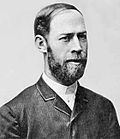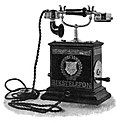Portal:Telecommunication
The Telecommunication Portal

Telecommunication, often used in its plural form or abbreviated as telecom, is the transmission of information over a distance using electronic means, typically through cables, radio waves, or other communication technologies. These means of transmission may be divided into communication channels for multiplexing, allowing for a single medium to transmit several concurrent communication sessions. Long-distance technologies invented during the 20th and 21st centuries generally use electric power, and include the telegraph, telephone, television, and radio.
Early telecommunication networks used metal wires as the medium for transmitting signals. These networks were used for telegraphy and telephony for many decades. In the first decade of the 20th century, a revolution in wireless communication began with breakthroughs including those made in radio communications by Guglielmo Marconi, who won the 1909 Nobel Prize in Physics. Other early pioneers in electrical and electronic telecommunications include co-inventors of the telegraph Charles Wheatstone and Samuel Morse, numerous inventors and developers of the telephone including Antonio Meucci, Philipp Reis, Elisha Gray and Alexander Graham Bell, inventors of radio Edwin Armstrong and Lee de Forest, as well as inventors of television like Vladimir K. Zworykin, John Logie Baird and Philo Farnsworth.
Since the 1960s, the proliferation of digital technologies has meant that voice communications have gradually been supplemented by data. The physical limitations of metallic media prompted the development of optical fibre. The Internet, a technology independent of any given medium, has provided global access to services for individual users and further reduced location and time limitations on communications. (Full article...)
Selected article -

A satellite telephone, satellite phone or satphone is a type of mobile phone that connects to other phones or the telephone network by radio link through satellites orbiting the Earth instead of terrestrial cell sites, as cellphones do. Therefore, they can work in most geographic locations on the Earth's surface, as long as open sky and the line-of-sight between the phone and the satellite are provided. Depending on the architecture of a particular system, coverage may include the entire Earth or only specific regions. Satellite phones provide similar functionality to terrestrial mobile telephones; voice calling, text messaging, and low-bandwidth Internet access are supported through most systems. The advantage of a satellite phone is that it can be used in such regions where local terrestrial communication infrastructures, such as landline and cellular networks, are not available.
Satellite phones are popular on expeditions into remote locations where there is no reliable cellular service, such as recreational hiking, hunting, fishing, and boating trips, as well as for business purposes, such as mining locations and maritime shipping. Satellite phones rarely get disrupted by natural disasters on Earth or human actions such as war, so they have proven to be dependable communication tools in emergency and humanitarian situations, when the local communications system have been compromised. (Full article...)
General images
Things to do
 |
Here are some tasks awaiting attention:
|
Selected biography -
Vladimir Kosma Zworykin (1888/1889 – July 29, 1982) was a Russian-American inventor, engineer, and pioneer of television technology. Zworykin invented a television transmitting and receiving system employing cathode-ray tubes. He played a role in the practical development of television from the early thirties, including charge storage-type tubes, infrared image tubes and the electron microscope. (Full article...)
Did you know (auto-generated) -

- ... that a Wisconsin radio station used to collect rent from the United States Congress?
- ... that officials installed a secret switch to shut down the radio station at the University of Akron in Ohio in case "radicals" took it over?
- ... that a Virginia radio station built a house to raise money for operations?
- ... that Colin Mackay, the political editor at Scottish Television, was "very sad" when Colin MacKay, the political editor at Scottish Television, died?
- ... that Ice King, the antagonist of television series Adventure Time, was at first received negatively by critics but later praised for representing mental health issues such as Alzheimer's disease?
- ... that the owner of a Pennsylvania radio station compared his job to that of Lee Iacocca at Chrysler?
Related portals
Topics
Subcategories
Associated Wikimedia
The following Wikimedia Foundation sister projects provide more on this subject:
-
Commons
Free media repository -
Wikibooks
Free textbooks and manuals -
Wikidata
Free knowledge base -
Wikinews
Free-content news -
Wikiquote
Collection of quotations -
Wikisource
Free-content library -
Wikiversity
Free learning tools -
Wiktionary
Dictionary and thesaurus
































































































